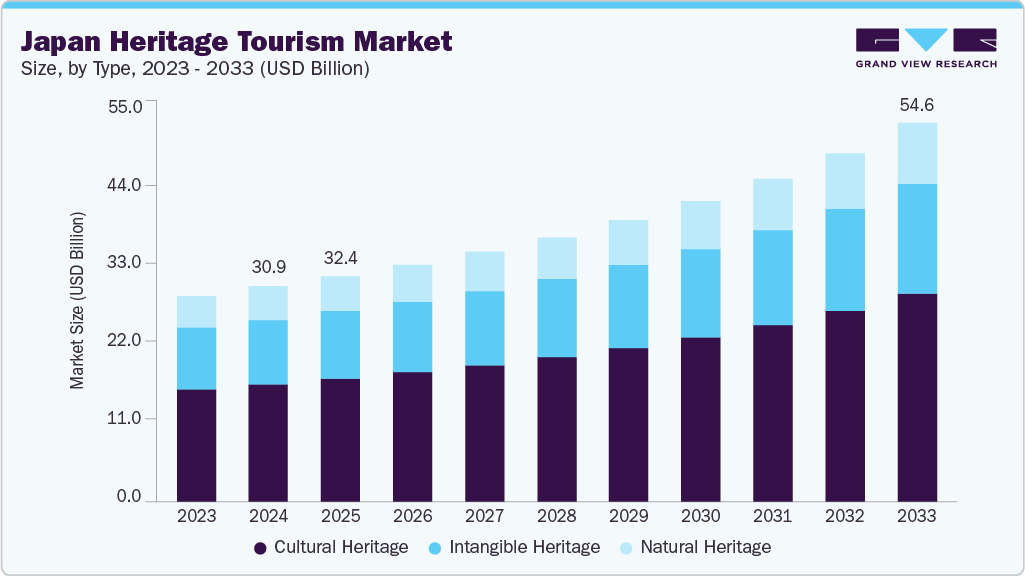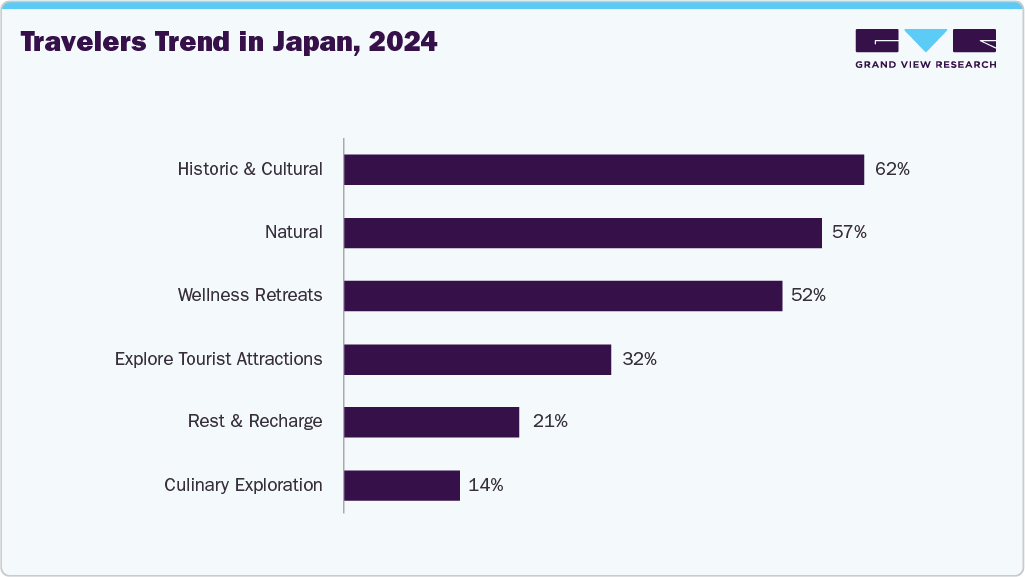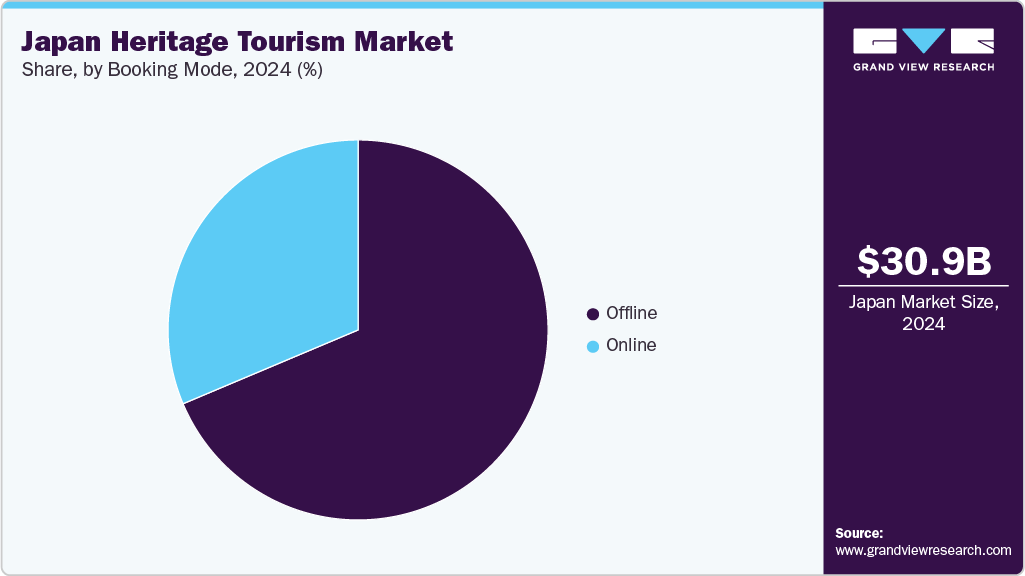Japan Heritage Tourism Market Trends
The Japan heritage tourism market size was estimated at USD 30,973.2 million in 2024 and is projected to grow at a CAGR of 6.7% from 2025 to 2033. The market is driven by cultural pride, government support, and increasing global interest in authentic, traditional experiences. Both domestic and international tourists are increasingly drawn to Japan’s rich historical sites, such as Kyoto’s temples, Nara’s ancient shrines, and the UNESCO-listed villages of Shirakawa-go and Gokayama. The Japanese government has recognized the potential of heritage tourism to boost regional economies and has invested in preserving cultural assets while improving accessibility through transportation and multilingual support.

The main trend is the growing appeal of “experiential travel,” where visitors seek deeper engagement with local culture. Activities such as tea ceremonies, traditional craft workshops, and samurai or kimono experiences in Japan. This hands-on approach offers more meaningful connections to heritage, appealing especially to younger travelers and cultural enthusiasts. Additionally, the rise of social media has amplified interest in picturesque historical destinations, further fueling demand.
Demographic shifts and sustainable tourism are also influencing the market. With Japan’s aging population and declining rural communities, heritage tourism is seen as a tool to revitalize local economies and preserve traditions. Sustainability has become a key focus, with efforts to balance tourist influx with cultural preservation and community well-being, ensuring heritage remains intact for future generations. For instance, new generations appreciate crafts made by hand, and meals cooked with seasonal local ingredients grown on nearby farms. A nascent tourist trail was formed who want to explore Japanese culture, heritage, and tradition but in a luxurious way.
Japan Heritage Tourism Market: Consumer Survey & Insights
There is a rising demand from both domestic and international tourists for immersive and restorative travel experiences, particularly in Japan’s regional and rural areas. These destinations offer access to cultural heritage sites, natural landscapes, and wellness retreats, which are gaining traction as travelers seek deeper, more meaningful engagement during their journeys. This trend presents opportunities for tourism operators to innovate offerings that cater to multidimensional travel motivations grounded in cultural value, authenticity, and well-being.
According to a survey conducted by Traveloka in partnership with YouGov in December 2024, which surveyed nearly 12,000 travelers across nine Asia-Pacific countries, including over 1,000 participants from Japan, distinct preferences have emerged among Japanese tourists. The study reveals that (32%) of Japanese travelers primarily travel to explore tourist attractions, followed by rest and recharge (21%), and culinary exploration (14%).

62% of respondents expressed a preference for historical and cultural destinations, such as museums, temples, and castles. This is closely followed by natural attractions (57%), including mountain ranges and scenic landscapes. Notably, (52%) of Japanese travelers also showed interest in wellness retreats, indicating a growing inclination toward travel experiences that blend cultural engagement with physical and mental rejuvenation.
Type Insights
Culture heritage tourism accounted for a share of 54.54% in the overall Japan’s heritage tourism industry in 2024. The growth is primarily driven by increasing demand for immersive, experience-based travel and Japan’s strategic emphasis on preserving and showcasing its cultural assets. Government initiatives to revitalize rural areas, improved accessibility to heritage sites through high-speed rail and digital infrastructure, and a surge in international tourist interest post-pandemic.
Trends such as participatory tourism, where visitors engage in activities like kimono dressing, traditional crafts, and temple stays, are reshaping the market. Social media and influencer-driven exposure of lesser-known cultural destinations also expand visitor interest beyond traditional hotspots like Kyoto and Nara. The focus on sustainable tourism and community-based preservation further strengthens the value proposition of cultural heritage tourism.
Natural heritage tourism market is expected to grow at a CAGR of 7.1% from 2025 to 2033, reflecting rising demand for eco-conscious and nature-based travel experiences. The growth is driven by increasing environmental awareness among domestic and international travelers and Japan’s strategic promotion of its diverse natural landscapes, national parks, volcanic hot springs, coastal trails, and UNESCO-recognized sites like Yakushima Island. The growing popularity of wellness tourism, outdoor adventure activities, and slow travel aligns with consumer preferences for sustainable, low-impact tourism.
Age Group Insights
Travelers between 51-70 age group accounted for a share of 58.69% in the overall Japan heritage tourism industry in 2024, highlighting a strong preference for culturally enriching and historically significant travel experiences within this demographic. This age group, often comprising financially stable, time-rich retirees and pre-retirees, prioritizes meaningful and educational travel over mass-market tourism. Key drivers include a deep appreciation for history, architecture, and traditional arts, and a desire for nostalgic or spiritual experiences such as temple visits, onsen stays, and cultural festivals.
Travelers between the 31-50 age group is expected to grow at a CAGR of 7.3% from 2025 to 2033. Driven by a rising preference for culturally rich, experience-based travel among mid-career professionals and young families. This demographic seeks a balance between leisure and learning, with a growing interest in authentic experiences that offer deeper engagement with Japan’s historical, spiritual, and architectural heritage. Drivers include higher disposable income, flexible travel preferences, and a strong desire for educational and meaningful vacations that align with personal values and family enrichment.
Booking Mode Insights
Booking through offline mode generated a revenue share of 68.65% in 2024 in the overall Japan heritage tourism industry. Indicating a strong consumer preference for personalized, trust-based travel planning when engaging with culturally significant experiences, especially prevalent among older travelers, group tour participants, and international visitors who seek the expertise, assurance, and tailored service that offline agents, tour operators, and travel consultants. Heritage tourism often involves multi-day itineraries, remote destinations, and immersive cultural experiences, which require in-depth planning and local insights, services that offline booking platforms are better equipped to offer.

Booking through online mode is expected to grow at a CAGR of 7.5% from 2025 to 2033, the shift is driven by the increasing digital adoption among younger travelers and tech-savvy international tourists. It is fueled by the demand for convenience, real-time access to travel options, and personalized itinerary planning. Online platforms offer flexibility, price comparison, user-generated reviews, and multimedia content that help travelers make informed decisions when exploring heritage destinations across Japan.
Key Japan Heritage Tourism Company Insights
Japan heritage tourism market is fragmented primarily due to the presence of several globally recognized players as well as regional players. Some prominent companies in the Japan heritage tourism industry are JTB Corporation, Heritage Harmony Tours, Tourist Japan DMC, JTB Global Marketing & Travel, Bamba Travels, Stunning Tours, Intrepid Travel,On The Go Tours, Motenas Japan, The Dragon Trip, and others.
Tourist Japan DMC is a Tokyo-based Destination Management Company with over 15 years of experience, delivering bespoke, culture-rich travel experiences throughout Japan. Personalized itineraries through Kyoto, Nara, Takayama, Shirakawa-go, and lesser-known villages-featuring temple visits, local shrine rituals, museum tours, and UNESCO site immersion. Delivers on-site learning-tea ceremonies, calligraphy, shrine blessing participation, samurai workshops, local artisan visits-ensuring cultural authenticity and depth.
JPT Corporation is a Tokyo-based travel agency specializing in fully customized private and small-group tours across Japan. Catering to both international visitors and domestic travelers, JPT emphasizes flexibility, detailed planning, and high personalization. Their services include tailored heritage and cultural itineraries, private chauffeur-guided excursions, luxury fleet vehicles, multi-generational family travel, and accessible tours for guests with mobility needs.
Key Japan Heritage Tourism Companies:
Heritage Harmony Tours
JPT Corporation
Tourist Japan DMC
JTB Global Marketing & Travel
Bamba Travels
Stunning Tours
Intrepid Travel
On The Go Tours
Motenas Japan
The Dragon Trip
Recent Developments
In March 2025, The strategic acquisition of Tokyo-based Destination Management Company RL Travel by Tweet World Travel has led to its rebranding as Tweet Japan DMC. This move significantly expands Tweet World Travel’s global footprint and reinforces its operational capabilities and market expertise within the Asian travel sector.
In December 2024,Sunrise Tours which offers special experiences of Japanese culture, nature, customs, and people has launched a private helicopter service to Mt. Fuji & Hakone Tour departing from Tokyo.
Japan Heritage Tourism Market Report Scope
Report Attribute
Details
Market revenue in 2025
USD 32,450.2 million
Revenue forecast in 2033
USD 54,580.2 million
Growth rate (Revenue)
CAGR of 6.7% from 2025 to 2033
Actual data
2021 – 2024
Forecast period
2025 – 2033
Quantitative units
Revenue in USD million/billion and CAGR from 2025 to 2033
Report coverage
Revenue forecast, company ranking, competitive landscape, growth factors, and trends
Segments covered
Type, age group, booking mode
Country scope
Japan
Key companies profiled
JTB Corporation; Heritage Harmony Tours; Tourist Japan DMC; JTB Global Marketing & Travel; Bamba Travels; Stunning Tours; Intrepid Travel; On The Go Tours; Motenas Japan; The Dragon Trip
Customization
Free report customization (equivalent up to 8 analysts working days) with purchase. Addition or alteration to country, regional & segment scope
Pricing and purchase options
Avail customized purchase options to meet your exact research needs. Explore purchase options
Japan Heritage Tourism Market Report Segmentation
This report forecasts revenue growth at the country level and provides an analysis of the latest industry trends and opportunities in each of the sub-segments from 2021 to 2033. For this study, Grand View Research has segmented the Japan heritage tourism market based on type, age group, and booking mode:
Type Outlook (Revenue, USD Million, 2021 – 2033)
Cultural Heritage
Natural Heritage
Intangible Heritage
Age Group Outlook (Revenue, USD Million, 2021 – 2033)
30 and Under
31-50
51-70
70 and Above
Booking Mode Outlook (Revenue, USD Million, 2021 – 2033)
Frequently Asked Questions About This Report
b. The Japan heritage tourism market was estimated at USD 30,973.2 million in 2024 and is expected to reach USD 32,450.2 million in 2025.
b. The Japan heritage tourism market is expected to grow at a compound annual growth rate of 6.7% from 2025 to 2033 to reach USD 54,580.2 million by 2033.
b. Japan cultural heritage tourism market accounted for a revenue share of 54.54% of the Japan heritage tourism market in 2024, The growth is primarily driven by increasing demand for immersive, experience-based travel and Japan’s strategic emphasis on preserving and showcasing its cultural assets.
b. Some of the key players operating in the Japan heritage tourism market include JTB Corporation; Heritage Harmony Tours; Tourist Japan DMC; JTB Global Marketing & Travel; Bamba Travels; Stunning Tours; Intrepid Travel; On The Go Tours; Motenas Japan; and The Dragon Trip
b. Key drivers fueling Japan’s heritage tourism growth include rich cultural and natural heritage sites, immersive experiential activities (e.g. tea ceremonies, samurai reenactments), government support, digital innovation, sustainable and slow‑tourism trends.

AloJapan.com